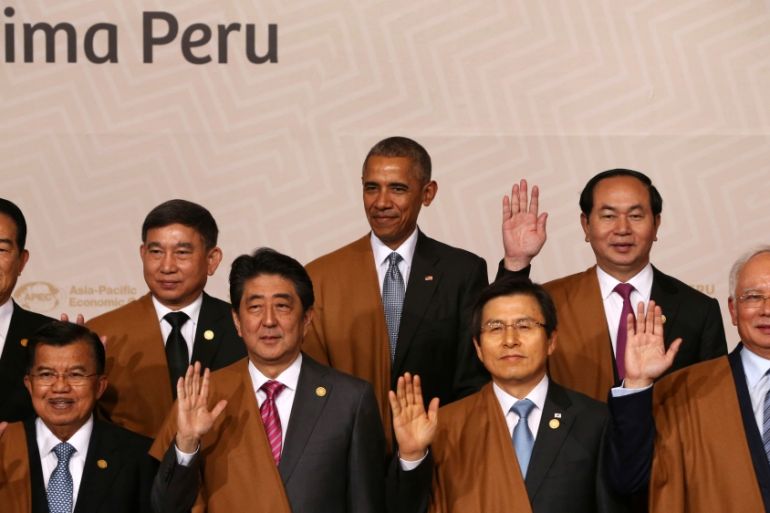APEC 2017: The leaders’ sideshow
Trade deals are expected to dominate talks at the Vietnam-based summit, yet expectations for major announcements are low.

The most memorable event at an Asia Pacific Economic Cooperation (APEC) summit is usually the traditional “silly shirt” photo opportunity, when some of the most powerful people on Earth don outfits selected by the host nation and stand together, trying to look comfortable in front of the cameras.
Last year, Peru, the summit’s host, gave each leader a woollen shawl.
Keep reading
list of 4 itemsRussia’s Putin eyes greater support from China for Ukraine war effort
India-Iran port deal: A gateway to Central Asia or a geostrategic headache?
India’s income inequality widens, should wealth be redistributed?
When 2017 host Vietnam last held APEC, in 2006, the heads of state were made to wear traditional long gowns known as “ao dai”.
It’s fair to say that the likes of then-US President George W Bush and his Russian counterpart, Vladimir Putin, looked a little stiff.
Putin, who is back in Vietnam this week for APEC 2017 in the central city of Da Nang, and US President Donald Trump may be feeling a little nervous about the hosts’ sartorial selection, and perhaps even hoping that the Vietnamese will follow the lead of the Japanese or Americans who have in the past thrown the fancy dress out and opted for smart casual or business suits.
New faces
Barry Soper, a veteran New Zealand political journalist, once suggested that what APEC really stood for was Ageing Politicians Expecting Cocktails.
|
|
But there are some younger leaders in the mix this time, including Jacinda Adern, the 37-year-old new prime minister of New Zealand, and her 45-year-old Canadian counterpart, Justin Trudeau.
However, the reality remains that APEC leaders’ summits very rarely result in anything that will grab headlines around the world – other than the family dress-up.
In fact, some could say that if the presidents and prime ministers stayed away completely, the outcomes would be similar.
If any deals or agreements are reached between governments or business leaders, they are usually hammered out by officials, such as trade representatives, well before the leaders arrive at APEC, which is usually for the summit’s two final days.
Will this year be different?
When it comes to news coming out APEC, this year could be different because of the presence of the human headline that is Trump – even if it is purely for entertainment value as the world watches and listens for what he might say or post on Twitter.
APEC will be dominated by talks around trade deals like the Trans-Pacific Partnership (TPP) – and Trump’s stance on multi-lateral agreements is well documented: he doesn’t like them. So, the other nations are forging ahead without the US.
But, of course, they cannot afford to ignore the world’s largest economy, so instead may play for time, hoping that either Trump has a change of mind, or there is a change of leadership in the US.
According to one senior official who has been involved in TPP negotiations, not everyone in the US government is on the same page as Trump when it comes to trade, with the message being whispered discreetly by some negotiators in Washington on the subject of multi-lateral deals is, “don’t give up on us, we’ll be back”.
With strong encouragement by Vietnam, which would dearly love to have a signed document to mark a successful APEC, the remaining 11 TPP nations will probably come to some sort of broad agreement while in Da Nang.
However, there are signs that it could be far from the final deal as some members push for changes to what is a complex, multi-layered pact that goes way beyond the simple buying and selling of goods and services.
There is also a danger is that, if it’s left too long, there is a greater chance of circumstances in some member countries changing, therefore putting their membership at risk.
Then again, a change in the US could be good for the TPP.